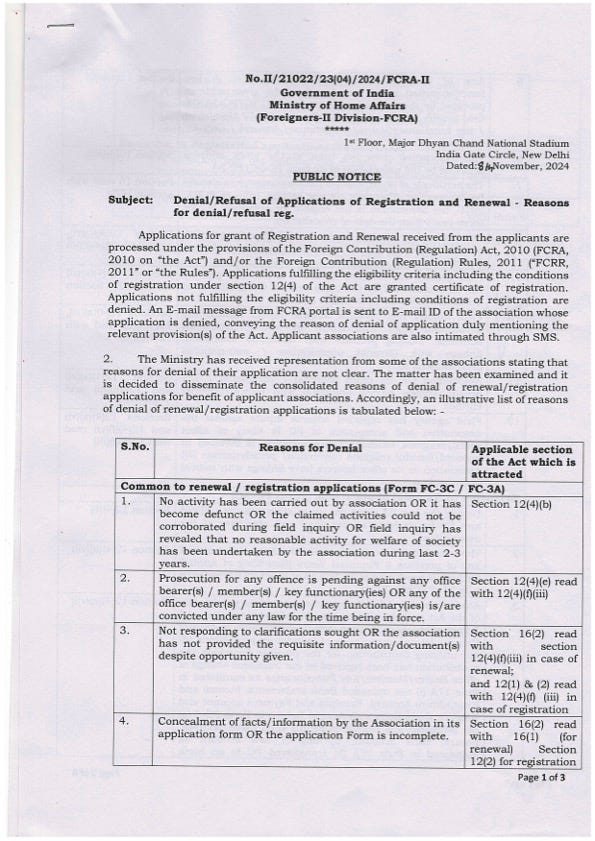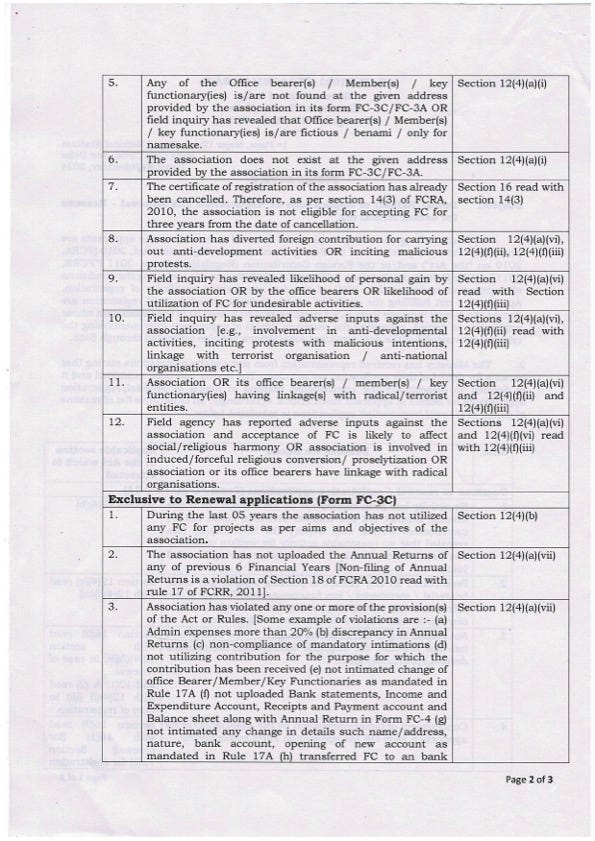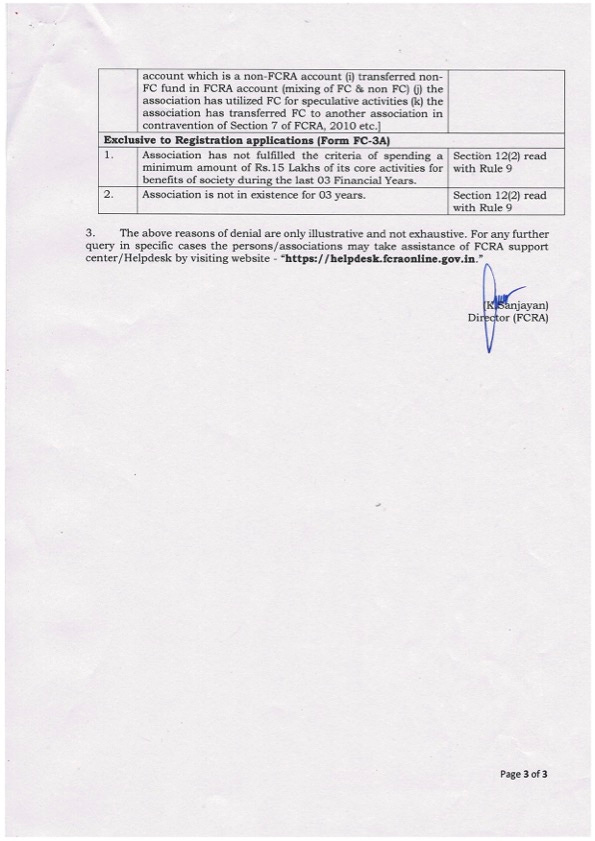#19 Foreign Contribution (Regulation) Act (FCRA) - new notifications, 8-November 2024
Analysis of the public notice by the FCRA department, Ministry of Home Affairs on the Denial/Refusal of Applications of Registration and Renewal of FCRA.
The recent public notice issued by the Ministry of Home Affairs on November 8, 2024, regarding the denial/refusal of applications for registration and renewal under the Foreign Contribution (Regulation) Act, 2010 (FCRA) has significant implications for non-governmental organizations (NGOs) and other entities receiving foreign contributions in India. This analysis examines the important aspects of the notice and its potential impact on the FCRA landscape.
The why: background and context.
The Foreign Contribution (Regulation) Act, 2010, and its associated rules regulate the acceptance and utilization of foreign contributions by certain individuals, associations, and companies in India. The Act aims to ensure that foreign contributions do not adversely affect the internal security, economic interests, and harmonious relationships between religious, racial, social, linguistic, or regional groups in India.
As of July 2023, there were 16,301 NGOs with valid FCRA licenses in India. I managed to scrape through the FCRA registrations from the official website, and found 4390 registrations, going back twelve years to 2012. An excel sheet of the same can be found here.
For the period of three financial years between 2019-2020 to 2021-2022, a total of 13,520 associations/NGOs received Rs 55,741.51 crore in foreign contributions.
This averages to about Rs 18,580 crore per year.
The data also shows that a small number of NGOs receive a disproportionately large amount of the total foreign contributions.
Over the last decade (2011-2021), the government cancelled FCRA licenses of 20,693 NGOs for violations of FCRA provisions. The recent notice comes in response to representations from some associations stating that the reasons for the denial of their applications were not clear. The Ministry has decided to disseminate consolidated reasons for the denial of renewal/registration applications to benefit applicant associations.
Key Aspects of the Notice
1. Clarification of Denial Reasons
The notice provides an illustrative list of reasons for denial of renewal/registration applications, along with the applicable sections of the FCRA, 2010. This transparency is intended to help applicant associations understand the grounds on which their applications may be rejected.
2. Common Reasons for Denial
The notice outlines several reasons that apply to both renewal and registration applications (Form FC-3C / FC-3A). These include:
Lack of activity or defunct status of the association
Pending prosecution or conviction of office bearers
Non-response to clarifications sought
Concealment of facts or incomplete application
Non-existence of office bearers or the association at the given address
Previous cancellation of registration
Diversion of foreign contributions for anti-development activities
Likelihood of personal gain or undesirable activities
Adverse inputs from field inquiries
Linkages with radical/terrorist entities
Potential impact on social/religious harmony
3. Specific Reasons for Renewal Applications
For renewal applications (Form FC-3C), additional reasons for denial include:
Non-utilization of foreign contribution for projects as per aims and objectives
Failure to upload Annual Returns for previous 6 Financial Years
Violations of FCRA provisions or rules
4. Specific Reasons for Registration Applications
For new registration applications (Form FC-3A), specific reasons include:
Failure to meet the criteria of spending Rs.15 Lakhs on core activities in the last 3 Financial Years
Association not in existence for 3 years
Implications and Analysis
1. Increased Transparency and Accountability
The publication of this notice represents a significant step towards increased transparency in the FCRA application process. By clearly outlining the reasons for denial, the Ministry provides applicants with a better understanding of the evaluation criteria. This transparency can potentially lead to:
Improved compliance: Organizations can proactively address potential issues before applying for, or renewing their registration.
Reduced ambiguity: Clearer guidelines may reduce the number of applications submitted with apparent deficiencies.
Enhanced accountability: The Ministry can be held more accountable for its decisions, as the criteria for evaluation are now public.
2. Stricter Scrutiny of Applications
The detailed list of reasons for denial indicates a rigorous approach to evaluating FCRA applications. This suggests:
Heightened due diligence: Applicants will need to ensure thorough compliance with all FCRA provisions and maintain impeccable records.
Increased field verifications: The notice emphasizes field inquiries, suggesting more on-ground checks of applicant organizations.
Focus on actual activities: Mere existence on paper is not sufficient; organizations must demonstrate tangible welfare activities.
3. Emphasis on National Security and Social Harmony
Several reasons for denial relate to national security concerns and potential threats to social harmony. This reflects the government's priority to prevent misuse of foreign funds for activities deemed detrimental to national interests. This may heighten scrutiny of organizations working in sensitive areas or on controversial issues, and push for organizations to show the impact of their work.
4. Financial and Operational Challenges for NGOs
The stricter enforcement of FCRA regulations may pose significant challenges for NGOs, particularly smaller organizations:
Financial strain: The requirement to spend Rs.15 Lakhs on core activities in the last 3 years for new registrations may be difficult for smaller NGOs, or newer NGOs that are starting out.
Operational hurdles: The emphasis on detailed record-keeping and compliance may increase administrative burdens.
Uncertainty in funding: The possibility of denial or non-renewal may create funding uncertainties for organizations dependent on foreign contributions.
5. Potential Impact on Civil Society Space
The comprehensive list of denial reasons, particularly those related to "anti-development activities" or "inciting malicious protests," may have implications for the civil society space in India:
Narrowing scope of activities: Organizations may self-censor or avoid certain types of work to ensure FCRA compliance.
Reduced diversity in civil society: Smaller, grassroots organizations may find it challenging to meet the stringent criteria, potentially leading to a landscape dominated by larger, well-established NGOs.
Impact on advocacy and rights-based work: Organizations engaged in advocacy or rights-based work may face increased scrutiny.
6. Enhanced Due Diligence for Donors
International donors and partners will need to exercise greater due diligence when working with Indian NGOs:
Increased vetting: Donors may need to conduct more thorough background checks on potential partner organizations.
Compliance support: There may be a need for capacity-building initiatives to help NGOs meet FCRA requirements.
Alternative funding models: Donors might explore alternative ways to support Indian civil society within the FCRA framework.
7. Increased Importance of Domestic Funding
The challenges in obtaining and maintaining FCRA registration may lead to a greater emphasis on domestic funding sources:
Shift in fundraising strategies: NGOs may need to develop robust domestic fundraising capabilities.
Corporate Social Responsibility (CSR) focus: There may be increased competition for CSR funds from Indian corporations.
Exploration of social enterprise models: Some organizations may explore hybrid models combining non-profit and for-profit activities to ensure sustainability.
8. Technological and Compliance Investments
To meet the stringent requirements, organizations may need to invest in better technology and compliance systems:
Enhanced record-keeping: Investment in robust financial management and reporting systems.
Compliance training: Increased focus on training staff in FCRA compliance and related legal requirements.
Due diligence mechanisms: Development of internal due diligence processes to vet projects, partners, and activities for FCRA compliance.
Recommendations for Stakeholders
For International Donors:
Enhance due diligence processes at the funder-level for Indian partner organizations.
Allow budgeting for capacity-building support to partners across the board, and not just on FCRA compliance adherence.
Increase the budget to allow for organization strengthening, especially on reporting mechanisms, tech platform integrations, robust accounting and financial management, internal audits and governance, communications and outreach, fundraising, etc. An estimated 15% extra budget ear-marked for these activities will have a multiplier effect, both in terms of operating efficiencies, and second-order effects on generating value and impact by the organizations.
Explore alternative funding models beyond grants to social enterprises and enabling ecosystem in India - the potential for PRI investments (program-related investments) in India is untapped, and huge.
Stay informed about FCRA developments and their implications for funding strategies.
For NGOs and Applicant Organizations:
Conduct thorough internal audits to ensure compliance with all FCRA provisions.
Maintain detailed documentation of all activities, especially those demonstrating societal benefit.
Invest in robust financial management and reporting systems.
Develop strong domestic fundraising capabilities to reduce dependence on foreign contributions.
Engage proactively with FCRA authorities for clarifications and guidance.
For Civil Society at Large:
Advocate for clear, objective criteria in FCRA implementation.
Engage in constructive dialogue with the government on the role of foreign contributions in development.
Develop sector-wide best practices for FCRA compliance and ethical operations.
The path forward.
The recent FCRA notice represents a significant development in the regulatory landscape for NGOs and other organizations receiving foreign contributions in India. While it provides much-needed clarity on the reasons for denying FCRA applications, it also signals a more stringent approach to regulation.
The implications of this notice are far-reaching, potentially affecting the operational dynamics of civil society organizations, their relationships with international partners, and the overall civil society space in India. It underscores the need for meticulous compliance, robust governance structures, and a clear demonstration of societal benefit by organizations seeking foreign contributions.
As the FCRA regime evolves, it will be crucial for all stakeholders – NGOs, donors, government agencies, and civil society at large – to engage in constructive dialogue to ensure that the regulatory framework balances national security concerns with the need for a vibrant and diverse civil society sector in India.
The coming years may see significant shifts in the NGO landscape, with increased emphasis on domestic funding, stringent compliance measures, and potentially, a recalibration of the role of foreign contributions in India's development narrative. Organizations that can adapt to these changes, demonstrate clear societal impact, and maintain impeccable compliance records will likely navigate this complex regulatory environment successfully.
Ultimately, the effectiveness of these measures will depend on their fair and transparent implementation, balancing the legitimate concerns of national security and social harmony with the valuable contributions of civil society organizations to India's developmental journey.
Sources
[1] FC-rules2011.pdf https://ppl-ai-file-upload.s3.amazonaws.com/web/direct-files/39828779/a33751c4-5d36-4bb5-828b-51fbc886e6cb/FC-rules2011.pdf
[2] fc_notice_11112024.pdf https://ppl-ai-file-upload.s3.amazonaws.com/web/direct-files/39828779/b8b4e5bc-84c1-437c-9995-05503d6acaa8/fc_notice_11112024.pdf
[3] GOVERNMENT OF INDIA https://ppl-ai-file-upload.s3.amazonaws.com/web/direct-files/39828779/a33751c4-5d36-4bb5-828b-51fbc886e6cb/FC-rules2011.pdf
[4] No.II/21022/23(04)/2024/FCRA-II Government of India Ministry of Home Affairs (Foreigners-II Division-FCRA) ***** https://ppl-ai-file-upload.s3.amazonaws.com/web/direct-files/39828779/b8b4e5bc-84c1-437c-9995-05503d6acaa8/fc_notice_11112024.pdf







